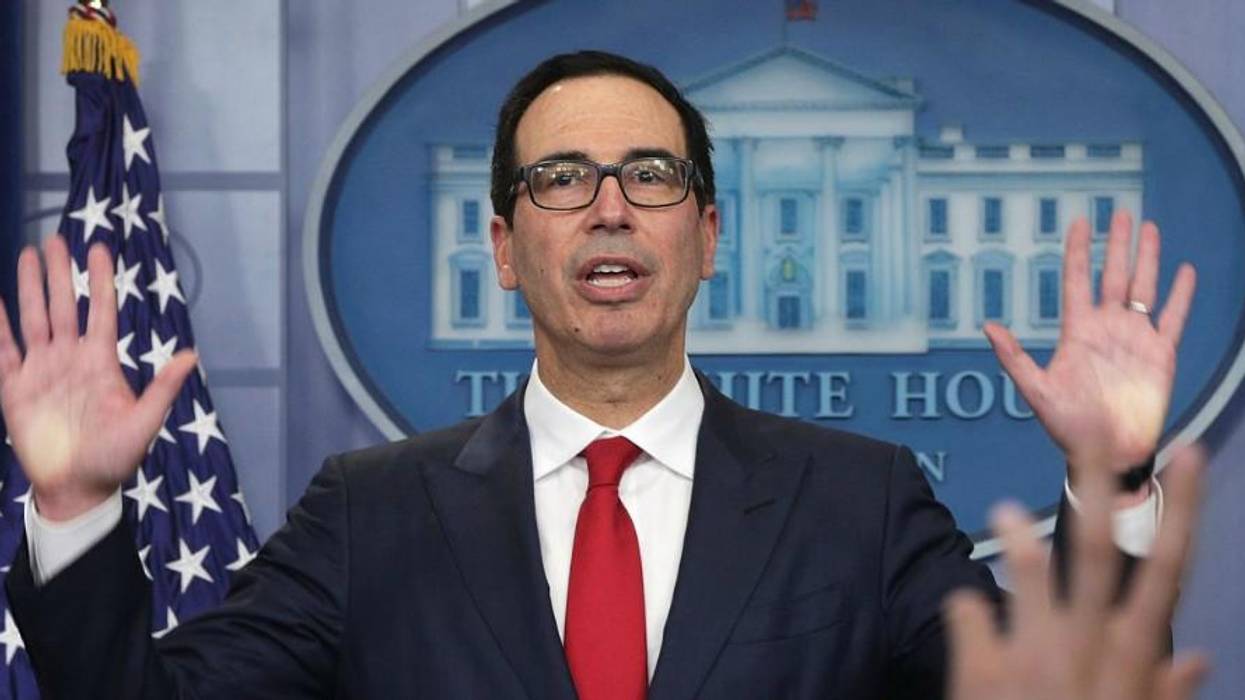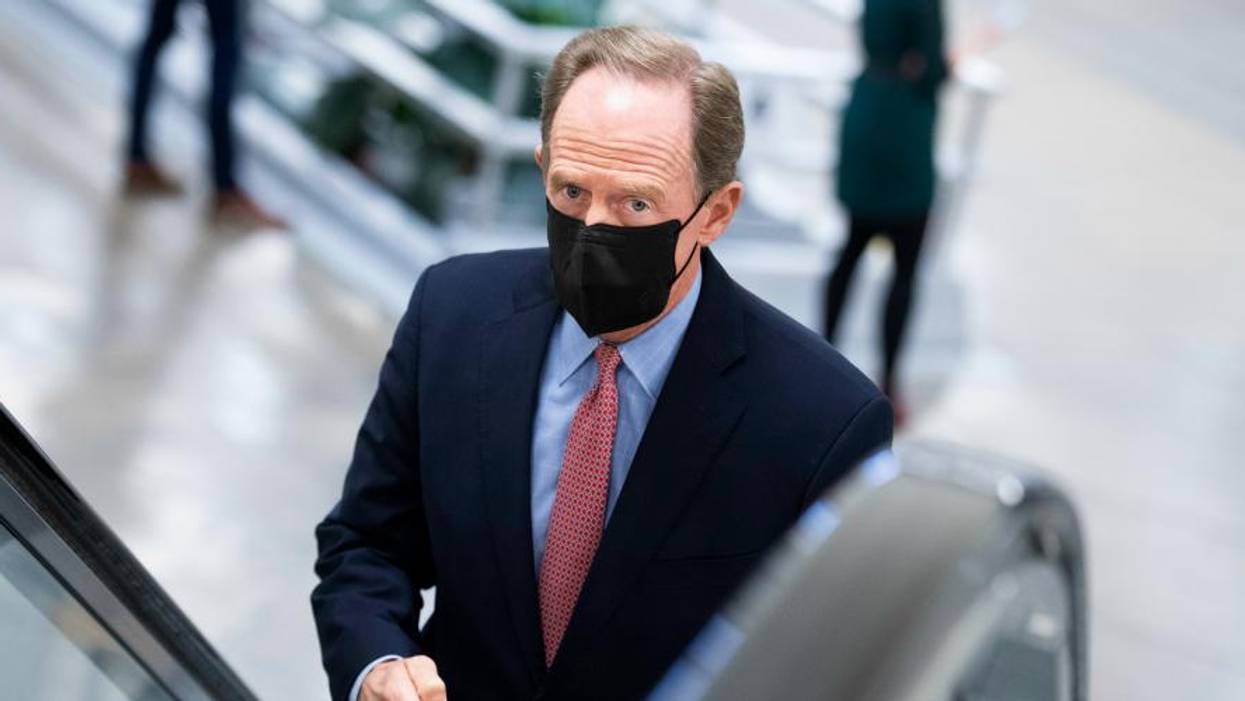Trump Lackeys Run to Rescue Ailing Bank in Predictable—And Telling—Move
Political reporters must explain the consequences likely to ensue if Steven Mnuchin, Joseph Otting, or their pro-Wall Street doppelgangers return for a second Trump administration.
Earlier this week, two of Donald Trump’s appointees—former Treasury Secretary Steven Mnuchin and former Comptroller of the Currency Joseph Otting—officially joined the board of New York Community Bancorp (NYCB) as part of a deal to buttress the struggling regional lender.
It was only last March that a NYCB subsidiary, Flagstar Bank, acquired many of Signature Bank’s assets from the Federal Deposit Insurance Corporation (FDIC). But in recent months, NYCB has found itself floundering as a result of the post-Covid-19 devaluation of commercial real estate.
NYCB announced last week that multiple institutional investors, led by a private equity firm founded and headed by Mnuchin, raised more than $1 billion to prop it up. In exchange, the bank reconstituted its board—shrinking it to ten members while designating four new directors, including Mnuchin and Otting, who will also serve as CEO.
The announcement of the cash infusion and leadership shakeup had an immediate effect, as NYCB shares quickly rebounded following a steep decline earlier in the day. Investors—including Mnuchin’s Liberty Strategic Capital, Hudson Bay Capital, Reverence Capital Partners, and the hedge fund Citadel—stand to make “hundreds of millions of dollars of paper profits if the shares maintain their gains,” according to the Financial Times.
To see Goldman Sachs alum Mnuchin and his pal Otting team up again to lead a financial institution is unsurprising, and yet that doesn’t make it any less troubling. From 2010 to 2015, Mnuchin and Otting worked together as executives at a scandal-ridden bank called OneWest. During that time, they repeatedly violated foreclosure laws to kick elderly people with reverse mortgages out of their homes. Vice President Kamala Harris’ refusal to prosecute the Pasadena-based lender when she was attorney general of California was a colossal and indefensible mistake.
To see Goldman Sachs alum Mnuchin and his pal Otting team up again to lead a financial institution is unsurprising, and yet that doesn’t make it any less troubling.
In 2017, Trump rewarded Mnuchin and Otting for their rapacious conduct by appointing them to his administration. Tapping the predatory pair to regulate the financial industry was brazen, but it made Trumpian sense; his team was a veritable who’s who of revolvers uninterested in curbing the exploitative practices that have made them and their peers so wealthy.
Barring unforeseen circumstances, the 2024 presidential election will be a rematch between Trump and Joe Biden. As campaigns kick into full gear, the news media would do well to reacquaint voters with what Trump appointees were up to before 2017, what they’ve been doing since 2021, and what their potential return to the White House would mean.
The American Prospect’s David Dayen, who reported on OneWest’s cruel repossession machine several years ago, said last week that he hopes “there aren’t any 95-year-olds with an NYCB loan facing foreclosure, that hasn’t historically ended well at a Mnuchin-owned bank!”
As it turns out, NYCB is one of the nation’s largest residential mortgage originators and servicers, with a focus on apartment buildings. It’s also a leading warehouse lender. Mnuchin has promised to pursue “a diversified and de-risked business model that supports long-term profitability,” but that doesn’t tell us what malfeasance he and Otting have in store for the coming months.
The last time Mnuchin and his partners bought a bank in distress, they engaged in ruthless behavior and made out like bandits. In 2009, a Mnuchin-led group of investors purchased IndyMac, a failed residential lender, from the FDIC for about $1.5 billion and renamed it OneWest, after which the bank proceeded to gobble up several competitors that were reeling in the wake of the 2007-2008 crash. When CIT Group obtained OneWest in 2015 for $3.4 billion, Mnuchin alone netted roughly $380 million.
Although it’s hard to predict the extent to which the NYCB investors are poised to capitalize on another real estate-fueled financial crisis, it’s easy to agree with Dayen, who added last week that “putting the OneWest gang back in charge of a bank rather than readying indictments is really distressing.”
In any case, Mnuchin and Otting’s move to join NYCB’s board serves as a reminder that Trump and his appointees have consistently prioritized Wall Street interests—before, during, and after his presidency. As Trump eyes a return to the White House, it’s worth stressing that presidential elections are never only about individual candidates; they’re also about how those candidates would control the vast apparatus known as the executive branch, including the types of regulators they’d likely appoint.
Mnuchin and Otting’s move to join NYCB’s board serves as a reminder that Trump and his appointees have consistently prioritized Wall Street interests—before, during, and after his presidency.
This year, we don’t have to rely on prognostication, as is usually the case with at least one candidate. We can contrast the personnel choices that Trump and Biden made during their respective first terms. By nominating bona fide vultures like Mnuchin and Otting to oversee the financial sector, Trump made it abundantly clear that he intended to facilitate plunder.
Even though Treasury Secretary Janet Yellen has her own objectionable ties to corporate interests and major blind spots, her tenure atop the department has been preferable to that of Mnuchin. And whereas Trump picked Otting to chair the OCC, Biden nominated a legitimate progressive. Sadly, Saule Omarova was forced to withdraw following a vicious right-wing smear campaign full of red-baiting. Opportunistic Senate Republicans and a handful of Senate Democrats used Omarova’s upbringing in the Soviet Union to falsely equate her profoundly democratic desire to subordinate finance to the public interest with Stalinism.
The point is that while another Trump administration is guaranteed to oil the wheels of upward redistribution and graft, a second Biden administration could advance a downwardly redistributive agenda. But voters will not know this distinction without informative coverage of Trump’s cronies and their corporate agenda.
For their part, journalists covering the 2024 campaign should remember that their job is to convey to voters how the country is likely to differ depending on whether Biden or Trump wins. Given that Trump has vowed to impose the GOP’s fascist agenda with dictatorial force, the stakes couldn’t be higher. It’s high time for political reporters to start probing who would benefit if the likes of Mnuchin, Otting, and Trump’s other Wall Street allies are given another chance. Here’s a tip: it won’t be the average working American.



